
Laura Sanders reports on neuroscience for Science News. She wrote Growth Curve, a blog about the science of raising kids, from 2013 to 2019 and continues to write about child development and parenting from time to time. She earned her Ph.D. in molecular biology from the University of Southern California in Los Angeles, where she studied the nerve cells that compel a fruit fly to perform a dazzling mating dance. Convinced that she was missing some exciting science somewhere, Laura turned her eye toward writing about brains in all shapes and forms. She holds undergraduate degrees in creative writing and biology from Vanderbilt University in Nashville, where she was a National Merit Scholar. Growth Curve, her 2012 series on consciousness and her 2013 article on the dearth of psychiatric drugs have received awards recognizing editorial excellence.

Trustworthy journalism comes at a price.
Scientists and journalists share a core belief in questioning, observing and verifying to reach the truth. Science News reports on crucial research and discovery across science disciplines. We need your financial support to make it happen – every contribution makes a difference.
All Stories by Laura Sanders
-
 Health & Medicine
Health & MedicineThe science behind kids’ belief in Santa
Children’s belief in Santa is strong — until it isn’t anymore, usually at around age 8.
-
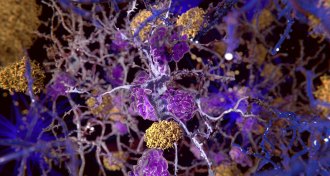 Neuroscience
NeuroscienceSpecks in the brain attract Alzheimer’s plaque-forming protein
Globs of an inflammatory protein can spur the formation of amyloid-beta clumps, a study in mice shows.
-
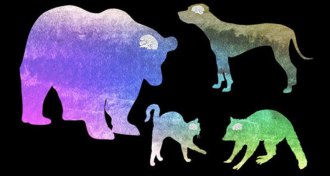 Neuroscience
NeuroscienceIn a tally of nerve cells in the outer wrinkles of the brain, a dog wins
Among some carnivores, golden retrievers rate at the top for numbers of nerve cells, study finds.
-
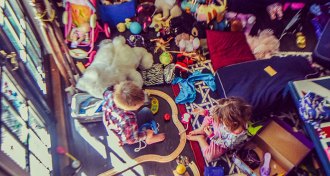 Health & Medicine
Health & MedicineAn abundance of toys can curb kids’ creativity and focus
Too many toys may lead to more shallow play for toddlers, a new study suggests.
-
 Neuroscience
NeuroscienceBrains of former football players showed how common traumatic brain injuries might be
Examinations of NFL players’ postmortem brains turned up chronic traumatic encephalopathy in 99 percent of samples in large dataset.
-
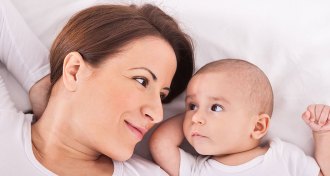 Health & Medicine
Health & MedicineStaring into a baby’s eyes puts her brain waves and yours in sync
Brain waves line up when adults and babies lock eyes.
-
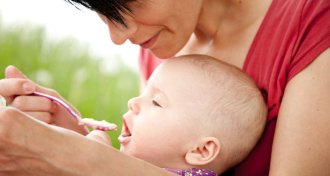 Health & Medicine
Health & MedicineSix-month-old babies know words for common things, but struggle with similar nouns
Young babies know a cup of juice from a car, but have a hard time distinguishing more similar nouns, a new study finds.
-
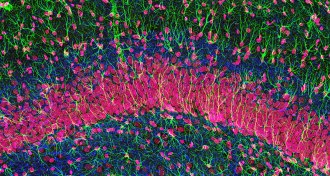 Neuroscience
NeuroscienceStudy casts doubt on whether adult brain’s memory-forming region makes new cells
An examination of 54 human brains suggests that adults don’t grow new neurons in the hippocampus, contrary to several widely accepted studies.
-
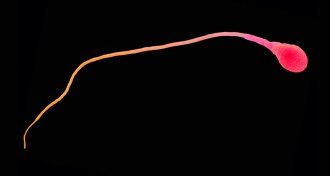 Health & Medicine
Health & MedicineHow dad’s stress changes his sperm
Stress may change sperm via packets of RNA in the epididymis, a mouse study suggests.
-
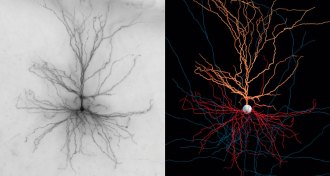 Neuroscience
NeuroscienceSee these first-of-a-kind views of living human nerve cells
A catalog of live brain cells reveals stunning diversity and intricate shapes, and may help scientists understand the abilities of the human brain.
-
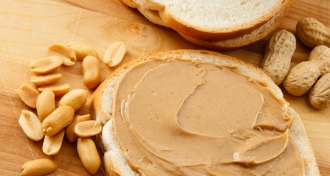 Health & Medicine
Health & MedicineLet most babies eat food containing peanuts. Really.
Pediatricians are not yet peanut-savvy when it comes to convincing parents to feed babies food containing peanuts, a new survey suggests.
-
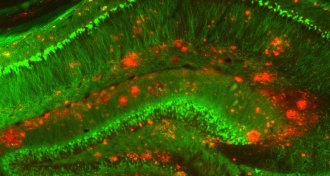 Neuroscience
NeuroscienceAlzheimer’s protein can travel from blood to build up in the brain
Experiments in mice show Alzheimer’s protein can travel from the blood of an affected mouse to the brain of a healthy animal.